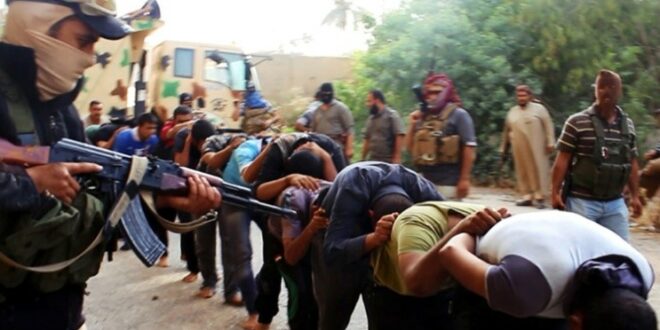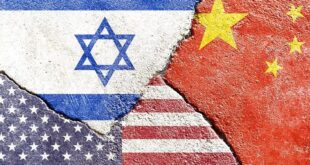Friday, June 10, 2014 would live in infamy for Iraq and its citizens. It was the day when Iraq lost its second largest city and cultural heart, Mosul, as well as the soul of Mesopotamia, at the hands of the global terrorist network that Saudi Arabia and its underlings in the Gulf States founded, financed, and deployed, first in Syria, and now in Iraq. A preponderance of evidence suggests that the Saudi prince Bandar Bin Sultan, Iraqi fugitive vice President Tariq al-Hashemi, Iraqi fugitive and former Finance Minister Rafe al-Essawi, and Izzat Ibrahim al-Douri, the Baath henchman, were finally able to realize their dream of partitioning Iraq. This mayhem resulted in the massacre of thousands of innocent Iraqi citizens, the desecration and destruction of holy shrines, and the devastation of most of the infrastructure that was developed by the U.S. Government. The Iraqi army quickly melted, and while it may be difficult to comprehend their sudden retreat, it must be noted that ISIS was in possession of advanced weaponry that could only have been supplied by Saudi Arabia and Qatar. Their advanced armaments, coupled with the local Salafi and Nakshbandi segments of Mosul’s population, won the day for ISIS and its benefactors. It is important to note that the ISIS fighters have so far done an impressive job in outdueling the larger, stronger, and better equipped armies of Syria, Iraq, and as recent as this past weekend, of Lebanon. These accomplishments could never have been possible without the infusion of an extremely large supply of quite superior warheads.
Nouri Kamal Maliki, who has been battling with the Salafi insurgency ever since his first coronation as prime Minister of Iraq in 2007, is now seeking a third term for himself. His opponents are not just Sunni and Kurd Muslims, but also his own Shia caucus, which has been signaling for his departure. However, he is the most experienced politician on the Iraqi horizon at this time, and during his seven year reign, the president’s position was occupied by a Sunni Kurd, the Speaker of the Parliament was a Sunni Arab, one of two vice presidents was a Sunni Arab, and other crucial positions, such as Foreign Affairs and Finance were either occupied by Sunni Arabs or Sunni Kurds. The argument suggesting that he is not inclusive of other ethnic and religious groups, therefore, does not hold any water. Moreover Maliki was extremely kind towards Christians (Asserian & Chaldian) as well as Yezidis and Turkmen during his past two terms. Sunni and Kurd politicians are attempting to deceive the poorly informed and gullible policy makers of Western governments to replace Mr. Maliki because they assume that another Shia Prime Minister would empower them far more and differently than Maliki. Little do they know that Maliki’s replacement could make their lives far more difficult. Maliki has done a masterful job in navigating Iraq, given its past 10 years of bloodshed and destruction, which to some extent was planned, programmed, and budgeted, by Saudi Arabia, Qatar, Kuwait, and Turkey. Maliki, though, will have to, sooner or later, exit the bloody political scene of Iraq and history will likely remember him as one of the strongest political leaders of his time.
The United States, with its shifting priorities, seems to be quite bewildered as it continues to weigh different options. Almost two months have gone by since the incursion of ISIS, but not much has come out of Washington except some knee-jerk reactions to the most catastrophic developments that are taking place on a daily basis. Pesh Merga, the supposedly invincible Kurdish militia, was pummeled during this past week by the ISIS fighters who conquered important villages that were under Kurdish control. ISIS has now begun to lust for Kirkuk, the oil rich urban enclave that the Kurds opportunistically usurped from the central government’s control during the chaos of Mosul’s fall. Also, The United States is still fiddling with the idea of resurrecting the so-called Sunni Awakening (Sahwa in Arabic) that worked only because the U.S. commanders, desperate in 2006 to showcase a victory, baited and bribed the Sunni tribal leaders to fight against Al-Qaida. Although most of the members of the Sunni Awakening never accepted a Shia takeover of Iraq, they still bilked hundreds of millions of dollars as blood money from the U.S. Treasury. Maliki, a shrewd politician, knew their game, and after Americans left him to his vetting process, did not allow most of these Sunni Awakening fighters to be merged in the Iraqi Armed forces. Now, under the guise of being disenfranchised by Maliki’s Shia government, the same cast of characters plans to fool U.S. policy makers once again. This game-plan will simply not work. “We don’t want a new Sahwa, or Militias that will be targeted or let down later”, said Ahmed Al Jabouri, governor of the Salaheddine province. “We need a formal force connected to the Defense Ministry that can protect our borders, maintain Iraq’s unity, and fight terrorism.”
The modern state of Iraq is part and parcel of Mesopotamia, one of the ancient civilizations in the Middle East; some of its citizenry, such as Asserians and Chaldian Christians, trace their roots to Biblical times. Yazedis, who are neither Christians nor Muslims, are original occupants of this land as well. Muslims, including Shia, Sunni, and Kurds, came much later, but throughout the course of the history of this region, all of these groups had more than their share of bloodshed and sufferings. Now it is ISIS, and prior to them the cruel and criminal Baath regime of Saddam, that masqueraded around and slaughtered human beings like lambs. The United States cannot permit Saudi Arabia, Kuwait, Qatar, or Turkey, to influence its foreign policy; nor can it afford other critical players such as Afghanistan, Islamic Republic of Iran, Pakistan and Iraq, to slip out of its sphere of influence. The formulation of a formidable foreign policy must not be based on a zero-sum thought process, but rather a balancing act that warrants systematic thinking and fair play. It behooves the U.S. and the rest of the West to move fast and take concrete steps to save a civilization.

Mayhem in Mesopotamia
Pages: 1 2
 Mouood Mouood English Edition
Mouood Mouood English Edition



